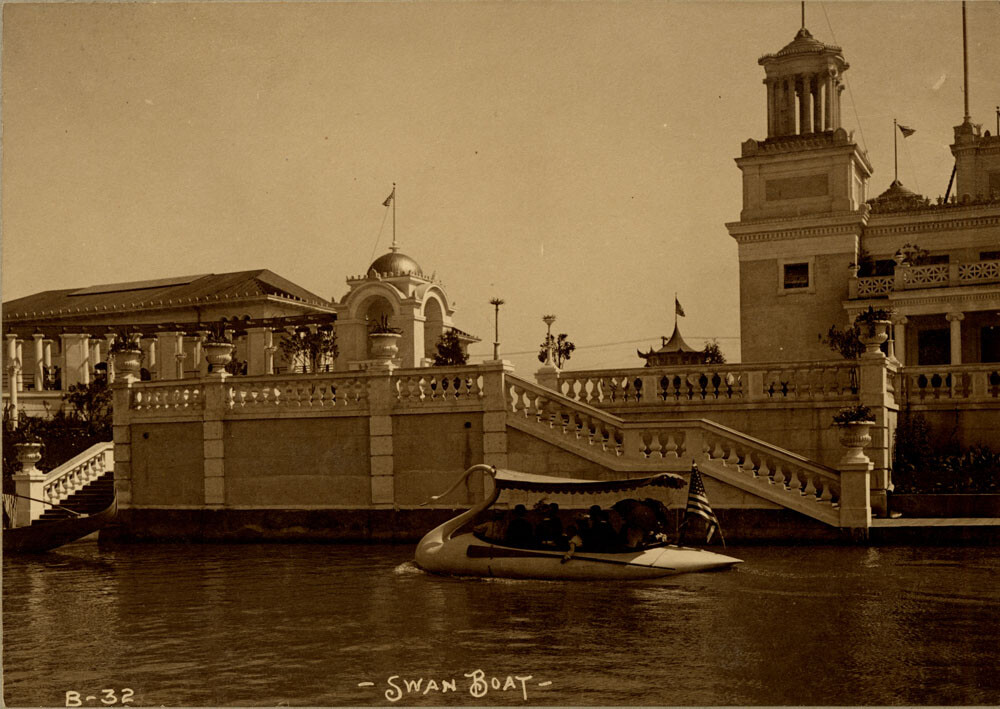
In Timothy Schaffert’s latest novel, dancers waltz in mid-air. A spooky automaton answers burning questions. A medicine man brews up potions to cure broken hearts. A ventriloquist plays straight man to a wise-cracking dummy.
The setting is 1898 Omaha, during the city’s version of a world’s fair. And many of the weird, wonderful and wicked details described in Schaffert’s work of fiction are based upon fact.
“The Swan Gondola” is the fifth novel produced by Schaffert, an assistant English professor.
Schaffert has become an expert on Omaha’s Trans-Mississippi and International Exposition, aka the Omaha World’s Fair, which drew about 2.7 million visitors between June 1 and Oct. 31, 1898.
Today he serves as project director for a digital archive, http://trans-mississippi.unl.edu, of photographs, memorabilia and text about the historic fair.
The archive is a joint project between the Omaha Public Libraries, which first established an archive of Trans-Mississippi materials after the event’s centennial in 1998, and UNL’s Center for Digital Research in the Humanities.
The exposition was Omaha’s own interpretation of the 1893 Chicago World’s Fair, complete with its “New White City” of grand but temporary exhibit halls, built of plaster and wood. Built along the Missouri River in northeast Omaha, the fairgrounds featured a seven-block Grand Court built around a lagoon where gondolas floated. A swan-shaped gondola can be seen in several historic photos.
Organizers boasted that Omaha’s White City was whiter and more beautiful than Chicago’s White City.
However, the buildings were never intended to be permanent. They began falling apart even before the fair ended and were later demolished.
Schaffert began researching the event in about 2006, as part of his work as a free-lance journalist. He used the world’s fair as the setting for a previous short story and began mulling ideas for a full novel.
“I was pretty intimidated by the research, so I didn’t exactly dive right into it,” he said. “It took me a while to figure out exactly what I wanted to have happen in the novel. I wrote another novel in the meantime, ‘The Coffins of Little Hope (2011).’”
In fact, Schaffert in the end was forced to jettison many true-life details from his book, such as a professor who roller skated in a den of lions; the wedding of a Zulu ostrich rider who advertised in the Omaha World-Herald for a bride; and a hot-air balloonist who accidentally dropped his craft into the lagoon.
Schaffert has been fascinated by fairs since his childhood on a farm just outside Aurora, Neb. The county fairgrounds were within sight of his house.
“Every summer, when the carnival came through, we could see the lights and the fireworks and all that,” he said. “We could walk to the fair. In my little town that was a major event and I definitely grew up with a lot of affection for the concept of fairs and the notion of temporary blasts of light that rise up from the fields in summer.”
He’s particularly interested in the fairs of the late 19th century and their reflection of a rapidly changing society.
“People in the 1890s thought the past was ending and they were stepping into the future. The 20th century was going to be a new age — and it was. There were great advances in medicine, sweeping changes in fashion and entertainment and women’s roles, psychology and new technology.”
Yet the Omaha fair, like fairs in general, included its exploitive and seedy side: sideshows, freak shows and scams. An Indian Camp highlighting Native American culture was essentially a live human exhibit. An Old Plantation show perpetuated demeaning stereotypes about black Americans. Pickpockets, thieves and con artists were among the fair’s attendees.
That aspect is an important part of his story, Schaffert said.
“You don’t want to sentimentalize it – you don’t want to whitewash it, you don’t want to pretend that all of that wasn’t part of it.”
Schaffert’s book, which has garnered favorable advance reviews, including Publisher’s Weekly, Booklist and Bookpage, will be released Feb. 6. There will be a book launch event Feb. 6 at Indigo Bridge books in Lincoln. On Feb. 7, Schaffert will hold a book signing in conjunction with the opening of a World’s Fair exhibit at the W. Dale Clark Library in downtown Omaha.








